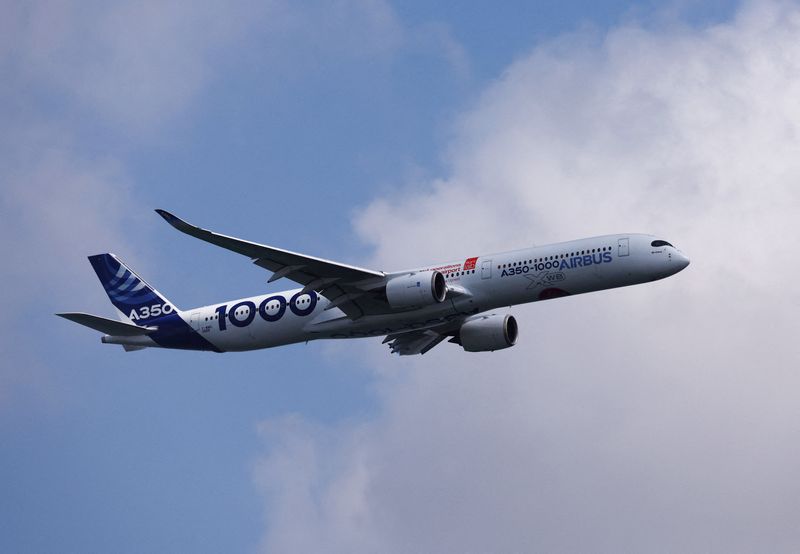
©Reuters. FILE PHOTO: An Airbus A350-1000 flies during an airborne display ahead of the Singapore Airshow at the Changi Exhibition Center in Singapore, February 18, 2024. REUTERS/Edgar Su/file Photo
By Lisa Barrington, Brenda Goh and Joe Brock
SINGAPORE (Reuters) – Singapore kicked off Asia’s biggest air show on Tuesday – the first in six years not affected by pandemic restrictions – as the global aviation industry grapples with a recovery in travel demand amid serious supply constraints.
More than 1,000 companies from more than 50 countries are participating in the biennial commercial and defense-focused Singapore Airshow, led by Western industry giants such as Airbus, Boeing (NYSE:) and Lockheed Martin (NYSE:) and their Chinese competitors such as COMAC and AVIC.
Russian companies such as Russian Helicopters and Irkut, which participated in past editions of the show, will not participate this year in the context of the war in Ukraine. However, Israeli companies Israel Aerospace Industries and Rafael Advanced Defense Systems are present, having abandoned the Dubai Airshow in November in the context of the war between Israel and Hamas in Gaza.
The in-flight displays feature military aircraft from Singapore, Australia, India, Indonesia, South Korea and the United States, as well as the first appearance of the COMAC C919 commercial jet outside China and an Airbus A350-1000 powered by 35% sustainable fuel for aviation.
COMAC posted the first aircraft orders for the show Tuesday morning, with China’s Tibet Airlines finalizing an order for 40 C919 single-aisle aircraft and 10 ARJ21 regional jets, and China’s Henan Civil Aviation Development and Investment Group placing an order 6 ARJ21.
Given the timing of the start of the year, there are typically fewer major order announcements at the Singapore air show than at its counterparts in Paris, Farnborough and Dubai.
By the end of 2023, travel demand had seen a near-complete recovery from 2019’s pre-pandemic levels, with domestic travel up 4% from pre-COVID levels and the international market lagging at 88% , mainly due to China’s slower recovery, according to data from the International Air Transport Association.
“While it has been easy to slow down in response to the pandemic-induced demand crisis, the ramp-up has been fraught with challenges,” Alton Aviation Consultancy said in a report on Tuesday. “Delays in returning aircraft to service, exacerbated by labor shortages across the entire value chain, have led to a slower pace of recovery in APAC.”
STRUGGLE IN THE SUPPLY CHAIN
Major suppliers, aircraft builders and engine makers have struggled to keep up with the recovery in demand after the sharp downturn during COVID-19 led to job losses, freight problems and skills shortages in the sector.
Boeing, in particular, is under scrutiny after the mid-air explosion of a cabin panel on an Alaska Airlines 737 MAX on January 5 led the US Federal Aviation Administration to take the unprecedented step of freezing the production of its best-selling single-aisle aircraft. plane at 38 per month.
Airbus this month announced a further delay in the entry into service of its long-range A321XLR single-aisle aircraft to the third quarter from the second. Suppliers told Reuters that Airbus is producing about 50 A320neo family jets a month compared to a production plan of 58 by the end of 2023.
Christian Scherer, chief executive of Airbus’ commercial aircraft business, said Tuesday that there are many “hot spots” in the aerospace supply chain.
“Increased production is putting pressure on supply chains everywhere and it is our job to address it,” he told reporters, adding that Airbus has deployed several dozen supply chain engineers to unblock bottlenecks.
Manufacturing problems are delaying airlines’ ability to replace older jets with more fuel-efficient models as the industry tries to reach its goal of “net zero” emissions by 2050.
Airlines are also trying to buy as much sustainable fuel as possible to reduce carbon emissions, even though it costs up to five times more than conventional jet fuel.
In Singapore, travelers will bear the cost of the transition to green jet fuel, the transport minister said on Monday, announcing the city-state’s plans for a tax on the prices of airline tickets departing from 2026.